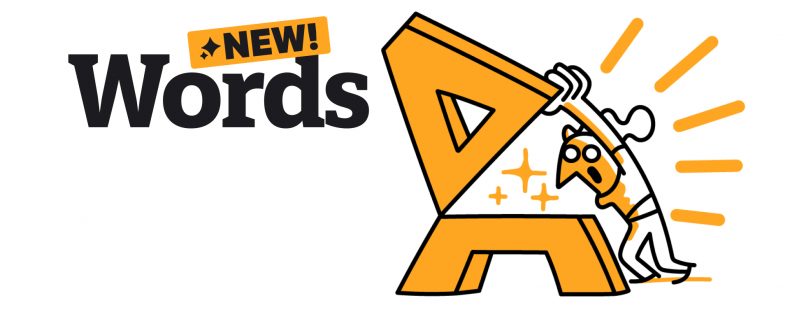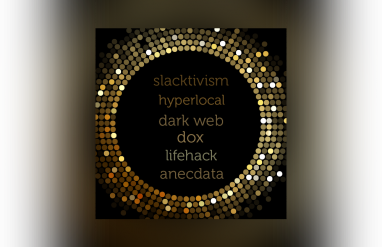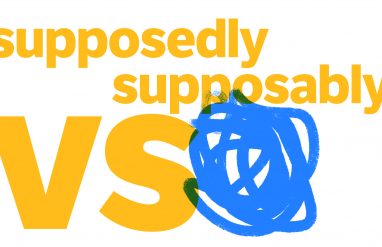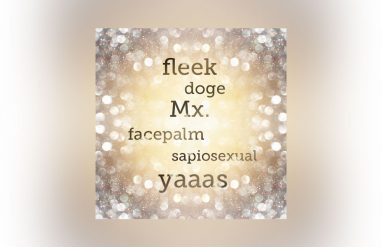Information pollution, jawn, decision fatigue, jolabokaflod, grandfamily, NIL, algo, amalgagender. Unbox the new terms and meanings just added to Dictionary.com.
by Nick Norlen, Senior Editor, and Grant Barrett, Head of Lexicography
Our fall new words drop is here!
The words don’t stop coming, so we’re updating the dictionary more frequently than ever. And not just with any words: this update includes an incredibly useful concentration of terms for naming the complexities of modern life.
They represent the always-evolving nature of English and our lexicographers’ neverending efforts to document it. This update captures:
- Complicated technical jargon that artificial intelligence has catapulted into our awareness (GPT, LLM)
- Intriguing loanwords from languages around the world (jolabokaflod, kakeibo)
- Fun insta-adds to your vocabulary for things you didn’t know there were words for (information pollution, decision fatigue, shower orange)
- And a ton of other lexical jawns!
On with the unboxing!
What’s Inside
We’ll break down the words that are new to the dictionary, newly added, or newly revised (such as the AI sense of hallucinate). Keep in mind that words that are new to the dictionary are not always new to the language (or even remotely recent), but their growth and change is just as interesting.
We can’t endorse any words, but we can document their use in the real world. We are descriptive—we describe language as it is really used (not just how we or others may wish it would be used).
Learn more about how new words get added to Dictionary.com—and how the dictionary works.
Here’s the breakdown for this release:

Of course, some of the terms in the list below have more than one definition. We’ll highlight just the meanings most relevant to this release.
Pop Culture & Slang
jawn
noun. Informal. Chiefly Philadelphia. something or someone for which the speaker does not know or does not need a specific name.
Example: Can you hand me that jawn right there?
📝 Philadelphians know that their favorite regional catchall term isn’t new—the first records of its use come from the early 2000s, when it started to be popularized in the Black community. Its addition reflects an increasing awareness of the term outside the region. Its ultimate origin is uncertain, but it may be a local Philadelphia variant of joint, which is used in a similar way in the New York City metropolitan area.
nepo baby
noun. a celebrity with a parent who is also famous, especially one whose industry connections are perceived as essential to their success.
NIL
abbreviation. name, image, likeness: aspects of a collegiate athlete’s identity for which they may earn money from a third party, as for advertising sponsorship or merchandise sales, although they are prohibited from being paid directly by colleges and universities for their participation in intercollegiate sports.
Blursday
noun. Informal. a day not easily distinguished from other days, or the phenomenon of days running together.
📝 Made-up day names are meant to capture the sameyness vibe of busy lives and work. Similar terms include Whoseday and Whensday.
shower orange
noun. an orange that is peeled and eaten under a steamy shower, the purported benefit being that the steam enhances the orange’s citrusy fragrance and creates a soothing experience for the person who is showering.
📝 The phenomenon and the name for it were popularized by a viral social media trend. Keep an eye out for similar practices, including shower beer and shower wine.
Godwin’s Law
noun. an adage of internet culture stating that as any discussion or debate grows longer, there is a proportionate increase in the probability that someone will invoke a comparison to Hitler or the Nazi party.
📝 Named after U.S. lawyer and author Mike Godwin (born 1956), who formulated the adage in 1991.
Poe’s Law
noun. an adage of internet culture stating that unless some tone indicator is used, it is impossible to tell the difference between an extreme view being sincerely espoused and an extreme view being satirized.
📝 Named after Nathan Poe, who posted about the concept on an internet forum in 2005. But the concept predates Poe’s post.
campaign
noun. a story in a role-playing game, spread out over multiple play sessions, that usually keeps the same plot, setting, or main characters.
📝 This is just one example of a word that’s obviously not new but for which our lexicographers have added a more recent sense.
Modern Problems
As new phenomena proliferate in our complex modern world, new terms emerge to capture their specificity—a process shaped and accelerated by online culture and digital discourse. This is especially the case for behaviors considered toxic or harmful; those wishing to shine a spotlight on such practices often do so most effectively by giving them a specific name.
information pollution
noun. the introduction of falsehood, irrelevance, bias, and sensationalism into a source of information, resulting in a dilution or outright suppression of essential facts.
📝 There are many sources of information pollution, and a newly prominent one is AI. See the relevant AI sense of hallucinate below.
greenwashing
noun. an instance or practice of promoting or affiliating a brand, campaign, mission, etc., with environmentalism as a ploy to divert attention from policies and activities that are in fact anti-environmentalist.
📝 The ending -washing in greenwashing and sportswashing below comes from the verb whitewash.
sportswashing
noun. an instance or practice of rehabilitating the bad reputation of a person, company, nation, etc., or mitigating negative press coverage with a sports event, or an appeal to unify and reconcile groups in conflict by celebrating fans’ shared love of a game.
crypto-fascism
noun. secret support for fascism.
📝 Note that crypto- is used here as a combining form meaning “hidden” or “secret,” not as a reference to cryptocurrency (which is now often referred to as crypto for short).
sextortion
noun. criminal behavior in which a perpetrator illicitly obtains sexually compromising material, such as images, and then threatens to publish it or harm the victim in other ways unless further material or a sum of money is surrendered.
📝 A blend of sex and extortion.
jugging
noun. Informal. a theft committed by a perpetrator who waits at a bank, near an ATM, or outside an expensive store, watches for customers who might be carrying a large amount of cash or goods, and then follows them to steal the money or goods from the customer or from their car.
📝 The word jugging is modeled on mugging. The word jug can be a slang term for a bank.
hostile architecture
noun. design elements of public buildings and spaces that are intended to stop unwanted behavior such as loitering or sleeping in public by making such behavior difficult and uncomfortable.
prison industrial complex
noun. the network of government agencies and private industry that foster, benefit from, and contribute to mass incarceration, the imprisonment of large numbers of people.
📝 Relatedly, this update also includes the newly added words decarcerate and decarceration, both used in the context of efforts to reduce the number of people in prison.
crony capitalism
noun. an economic system in which success in business is obtained through relationships to people in political power rather than through competition.
📝 The word crony means a close friend, but it is often used negatively, especially in the context of business and politics.
Big Pharma
noun. pharmaceutical companies considered collectively, especially with reference to their political and commercial influence.
📝 The construction used to create this phrase, in which the word Big is paired with a specific industry (such as in similar phrases like Big Oil), usually carries a negative connotation.
Artificial Intelligence
This year marked a tipping point for mainstream awareness of AI, what it’s capable of, and terms related to how it works (and, in some cases, how it doesn’t).
generative AI
noun. Computers. artificial intelligence that is designed to process prompts from users and respond with text, images, audio, or other output that is modeled on a training data set.
chatbot
noun. a computer program designed to respond with conversational or informational replies to verbal or written messages from users.
GPT
abbreviation. Computers, Digital Technology. generative pre-trained transformer: a type of machine learning algorithm that uses deep learning and a large database of training text in order to generate new text in response to a user’s prompt.
 Illustration: Iván Bravo. Hallucinate. 2023.
Illustration: Iván Bravo. Hallucinate. 2023.
hallucinate
verb. Computers, Digital Technology. (of a machine learning program) to produce false information contrary to the intent of the user and present it as if true and factual.
📝 Be prepared to start hearing and reading about this with increasing frequency—including in discussions of how AI researchers still don’t fully understand how it happens.
LLM
abbreviation. Computers. large language model: a type of machine learning algorithm trained on extremely large data sets of existing language and designed to generate new, naturalistic responses to prompts.
Science & Tech
biohacking
noun. strategic biological experimentation, especially upon oneself, using technology, drugs, hormones, diet, etc., with the goal of enhancing or augmenting performance, health, mood, or the like.
algo
noun. Computers. Informal. algorithm.
bloatware
noun. Computers. unwanted software that is preinstalled on a newly bought device, especially when it negatively impacts the device’s performance.
neobank
noun. a digital bank, typically without a charter, that operates only online or on mobile platforms, providing some traditional banking services, such as checking and savings accounts, at low or no cost to customers.
pessimize
verb. to make less good, efficient, fast, functional, etc., especially in the context of computers or information technology.
📝 The opposite of optimize.
Health & Wellness

Illustration: Iván Bravo. Decision Fatigue. 2023.
decision fatigue
noun. Psychology. Psychiatry. mental and emotional exhaustion resulting from excessive or relentless decision-making, especially the cumulative effect of small decisions that one makes throughout each day.
doctor shop
verb. to obtain prescriptions for a controlled substance from more than one healthcare practitioner at a time.
coffee nap
noun. a short nap, usually 15-30 minutes, taken immediately after drinking a cup of coffee, the claimed benefit being that the energizing effect of caffeine may be bolstered by a sleeping body’s drop in adenosine levels.
sleep debt
noun. the difference between the amount of sleep a person needs and the actual amount of time spent sleeping, when the amount needed exceeds the time slept.
stress eating
noun. emotional eating, especially in response to stress, tension, or anxiety.
intermittent fasting
noun. a pattern of eating that involves regular short periods of fasting, such as by limiting food intake to a certain period of the day or to fewer meals on certain days of the week.
Identity & Relationships

Illustration: Iván Bravo. Grandfamily. 2023.
grandfamily
noun. a family in which one or more children live with and are raised by their grandparent or grandparents.
kinkeeping
noun. Sociology. the labor involved in maintaining and enhancing family ties, including organizing social occasions, remembering birthdays, sending gifts, etc.
diverse-owned
adjective. (of a business) owned by someone who is part of a group historically underrepresented in entrepreneurship, such as women, ethnic or racial minorities, LGBTQ+ people, etc.
box braids
noun. a hairstyle originating among Black people, in which the hair is parted into small squares or other shapes over the scalp and the hair from each section is woven into a braid.
CODA
abbreviation. noun. child of deaf adult / adults: a hearing person with a deaf parent or parents.
gay marry
verb. to marry a person of the same gender.
amalgagender
adjective. noting or relating to a person whose gender identity is linked to or impacted by the fact that they are intersex.
stealth
adjective. (of a transgender person) living as a cisgender member of one’s identified gender, without revealing that one is transgender.
polysexual
adjective. noting or relating to a person who is sexually attracted to people of various genders, but not necessarily to people of all genders.
polyromantic
adjective. noting or relating to a person who is romantically attracted to people of various genders, but not necessarily to people of all genders.
autosexual
adjective. noting or relating to a person who primarily feels sexual attraction to and desire for themselves, as opposed to other people.
autoromantic
adjective. noting or relating to a person who primarily feels romantic attraction to and desire for themselves, as opposed to other people.
📖 A Dictionary-Wide Change
In this most recent update, our lexicographers made dictionary-wide changes to remove binary-gendered phrases like his or her and he or she, which had appeared in hundreds of entries. In many cases, such phrases were replaced with their, they, or similar words. In other cases, entries were simply rewritten to avoid using a pronoun at all.
Examples
Here are two examples of the types of changes we made. One involves changing the phrase his or her to their. The other involves removing irrelevant pronouns altogether.
folk singer
Old definition:
a singer who specializes in folk songs, usually providing his or her own accompaniment on a guitar.
New revised definition (changing his or her to their):
a singer who specializes in folk songs, usually providing their own accompaniment on a guitar.
volunteer
Old definition:
a person who voluntarily offers himself or herself for a service or undertaking.
New revised definition (removing the pronouns altogether):
a person who voluntarily offers to perform a service or undertaking.
Why We Made This Change
This change was made for two reasons: inclusivity and usage. On the inclusivity side, his or her does not include people who use other pronouns. In terms of usage, they is simply much more common as a generic pronoun than he or she, including in spoken and all but the most formal types of written English. In fact, this has been the case for decades (even though people rarely notice it in speech). By making this change, we have made our entries more similar to how people actually speak and write, hopefully making the entries more natural-sounding—and thus more accessible to readers.
— Lexicographer K. E. Callaway
For Word Lovers
agelast
noun. Literary. a person who never laughs; a humorless person (often used attributively).
sonder
noun. the feeling one has on realizing that every other individual one sees has a life as full and real as one’s own, in which they are the central character and others, including oneself, have secondary or insignificant roles.
📝 Sonder was coined in 2012 by U.S. writer John Koenig in his blog The Dictionary of Obscure Sorrows; perhaps partly based on French sonder “to probe, plumb.”
mountweazel
noun. a decoy entry in a reference work, such as a dictionary or encyclopedia, secretly planted among the genuine entries to catch other publishers in the act of copying content.
📝 Yes, we’ve got some. No, we’re not going to tell you what they are.
paraprosdokian
noun. a sentence or expression in which the second part provides an unexpected resolution or contrast to the first part, as in I’d like to see you again, but I’ve lost my glasses.
📝 Other classic examples include If I could just say a few words… I’d be a better public speaker and Take my wife—please.
accismus
noun. an ironic rhetorical device, in which one feigns indifference, or makes a pretense of refusing something one desires.
Example: Clarence stating that he couldn’t possibly accept such a generous gift is an example of accismus, for he has repeatedly shown the audience his weakness for luxury.
Loanwords
The English language is famously spongey, absorbing terms from wherever it can. Here are some of the notable terms from our most recent update that English has borrowed directly from other languages.
jolabokaflod
noun. an Icelandic tradition in which books are given as Christmas presents and opened on December 24, after which the evening is spent reading the books: from a practice begun in 1944, when paper goods were among the most available items in postwar Iceland.
📝 The name of this charming tradition, pronounced [ yoh-luh–boh-kuh-flawd ], comes from the Icelandic word Jólabókaflóðið that literally translates to “(the) Christmas book flood.” (The first part of the word, Jól, is equivalent to the word Yule.)
kakeibo
noun. Japanese. a system of maintaining one’s household budget based on a simple financial philosophy of spending and saving that is both mindful and purposeful.
📝 Kakeibo comes from a Japanese term that literally translates to “household account book.” It was coined by Japan’s first woman journalist, Motoko Hani (1873–1957), who published the plan in a magazine in 1904.
hanbok
noun. Korean traditional dress, usually consisting of loose, tied garments such as wrapped shirts and robes, long full skirts, and trousers gathered at the ankles.
Climate & Extreme Weather
climate criminal
noun. a person, business, country, or other entity whose actions or activities are considered particularly destructive to the environment.
eco-hazardous
adjective. bad or dangerous for the environment.
📝 The opposite of eco-friendly.
climate refugee
noun. a person who has had to flee their home due to the negative effects of climate change.
atmospheric river
noun. Meteorology. a long, narrow corridor in the atmosphere that transports massive amounts of concentrated water vapor from the tropics: often responsible for extratropical cyclones and other extreme weather events, but also for commonly weaker systems of rain that replenish water supplies. Abbreviation: AR.
Useful “Un-” Words
uncrewed
adjective. (especially of an aircraft, ship, or spacecraft) without the physical presence of a person or people in control.
📝 Useful as un-gendered alternative to unmanned. The opposite, crewed, is also a word.
unsee
verb (used with object). to remove (something seen) from one’s memory or conscious awareness; to forget or ignore images or the like.
📝 Commonly used in the negative, as in That’s something you can’t unsee.
unsend
verb. to delete (a digital message such as an email or text) from the devices of the sender and receiver.
unfalsifiable
adjective. not able to be proven false, and therefore not scientific.
Even More Words
presentism
noun. the centering of present-day attitudes, values, and concepts in the interpretation of historical events.
work to rule
noun. the act of working only according to the strictest interpretation of written requirements and regulations, as a job action or protest.
chain migration
noun. a form of family immigration where one person is granted legal residency or citizenship to a country, and then petitions to bring their immediate or extended family into the country.
gastrodiplomacy
noun. the strategic promotion of a nation’s cuisine to build diplomatic connections and favorable public relations for that nation, such as by funding grants to open restaurants, create food-oriented workshops, publish cookbooks, etc.
snite
verb. British. to wipe mucus from (the nose), especially with the finger or thumb.
📝 It’s not pretty, but it sure is an efficient way to refer to this action.














